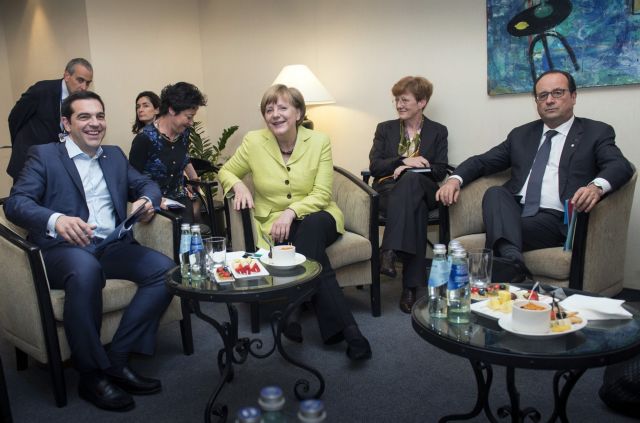Despite conflicting reports, the new meeting between Greek Prime Minister Alexis Tsipras, German Chancellor Angela Merkel and French President Francois Hollande in Brussels will go ahead as planned, on the sidelines of the EU summit.
Shortly after Athens submitted its revised proposal, international media outlets reported that the new Greek proposal was deemed “unreliable” and “vague”, with Reuters citing a European Commission officer, who warned that the new proposal would not be accepted.
This development put the meeting between the three leaders in jeopardy. The spokesperson for the European Commission Margaritis Schinas was quick to clarify that the anonymous link does not reflect the position of the Commission.
The EC Vice President Valdis Dombrovskis also stressed that an agreement with Greece would be possible over the next few days, provided there is an agreement on primary surplus targets and “special measures”. He warned though that “tactical moves” must stop and that “more work” was needed. He also commented that the institutions are currently evaluating the latest proposal and that Athens must clarify which measures it rejects and which it is prepared to implement.
Athens prepared to make further concessions
Although the new Greek counter-proposal has not officially been made public, it appears that the government is prepared to make further concessions in an effort to come to an agreement. This includes increasing the low and mid-range VAT rates (despite the institutions’ persistence on a VAT reform with only two rates) and higher primary surplus targets.
Specifically, the government is prepared to increase the mid-range VAT rate to 12% for basic food items and fresh produce, water, electricity, hotels and restaurants and the low VAT rate to 6.5% for medicine, books and theatre tickets.
The 23%, for all other products and services, is to remain as is. As for the primary surplus targets, Athens is willing to commit to a 0.75% target for 2015 and a 1.5% for 2016, from 0.6% and 1% in the initial counter-proposal. This is still short of the creditor plans, which provided primary surplus targets of 1% and 2% respectively.
Meetings with South American officials
Finally, on Tuesday evening that government announced that on the sidelines of the EU-CELAC summit, on Wednesday and Thursday, the PM will meet, among others, the President of Chile Michelle Bachelet, the President of Brazil Dilma Rousseff, the President of Bolivia Evo Morales, the President of Ecuador Rafael Correa, the Vice President of Cuba Miguel Díaz-Canel and Argentine Foreign Minister Héctor Timerman.



